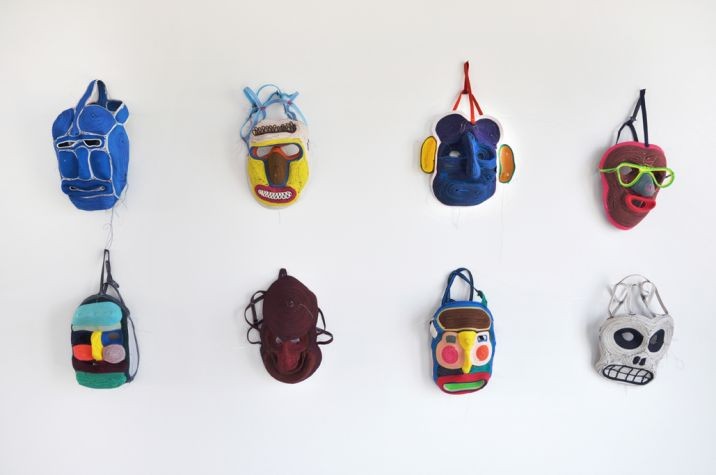Face Value
17 Nov 2011 - 08 Jan 2012
FACE VALUE
Bertjan Pot, 75b, Sophie Krier, Marga Weimans
17 November, 2011 – 8 January, 2012
In the exhibition Face Value, four established designers abandon their commercial bestsellers, winning house style designs or attractive logos and actually show the work in which they seek, hesitate or fail. What is the value of autonomy, authenticity and originality – so characteristic for the work of a visual artist – in the practice of product designer Bertjan Pot, graphic designers 75B, designer Sophie Krier and fashion designer Marga Weimans?
The spectre of market-oriented thinking as a solution for everything is currently at large in the Dutch cabinet policy. The world is now interpreted solely in economic terms: if you don’t make money, you’re finished. For the arts in the Netherlands it has become clear that they must force themselves into the straitjacket of supply and demand, of a product for which there must be a market. If subsidies are already being provided, these are now called investments. As far as the government is concerned, the product designers and the creative industry are the saviours of the cultural world, because they know how to deal with supply and demand. Dutch Design is the standard bearer for the Dutch arts and the designer is the spin-doctor for every product to be sold. Hal Foster already anticipated this in his well-known Design and Crime (2002).
Face Value focuses on the re-evaluation of the question of autonomy in the design process. What role does independent research play – non-commissioned, with no thought of possible applications and without significance – in the development of the designer’s work? In the exhibition, four prominent Rotterdam-based designers present their autonomous research as a structural component of their design practice. They show their indebtedness to the free arts and partly undermine the significance of their own commissioned practice. Without the words that belong to the discourse around design: utilizable, solution-oriented, durable, ecological social design. Free from supply and demand, they call attention to the fragile and difficult process of research, in a place outside the commercial arena, somewhere between the private and public moment, where it doesn’t just revolve around (mass) reproducible designs, but also around individual wishes and desires.
Bertjan Pot, 75b, Sophie Krier, Marga Weimans
17 November, 2011 – 8 January, 2012
In the exhibition Face Value, four established designers abandon their commercial bestsellers, winning house style designs or attractive logos and actually show the work in which they seek, hesitate or fail. What is the value of autonomy, authenticity and originality – so characteristic for the work of a visual artist – in the practice of product designer Bertjan Pot, graphic designers 75B, designer Sophie Krier and fashion designer Marga Weimans?
The spectre of market-oriented thinking as a solution for everything is currently at large in the Dutch cabinet policy. The world is now interpreted solely in economic terms: if you don’t make money, you’re finished. For the arts in the Netherlands it has become clear that they must force themselves into the straitjacket of supply and demand, of a product for which there must be a market. If subsidies are already being provided, these are now called investments. As far as the government is concerned, the product designers and the creative industry are the saviours of the cultural world, because they know how to deal with supply and demand. Dutch Design is the standard bearer for the Dutch arts and the designer is the spin-doctor for every product to be sold. Hal Foster already anticipated this in his well-known Design and Crime (2002).
Face Value focuses on the re-evaluation of the question of autonomy in the design process. What role does independent research play – non-commissioned, with no thought of possible applications and without significance – in the development of the designer’s work? In the exhibition, four prominent Rotterdam-based designers present their autonomous research as a structural component of their design practice. They show their indebtedness to the free arts and partly undermine the significance of their own commissioned practice. Without the words that belong to the discourse around design: utilizable, solution-oriented, durable, ecological social design. Free from supply and demand, they call attention to the fragile and difficult process of research, in a place outside the commercial arena, somewhere between the private and public moment, where it doesn’t just revolve around (mass) reproducible designs, but also around individual wishes and desires.

